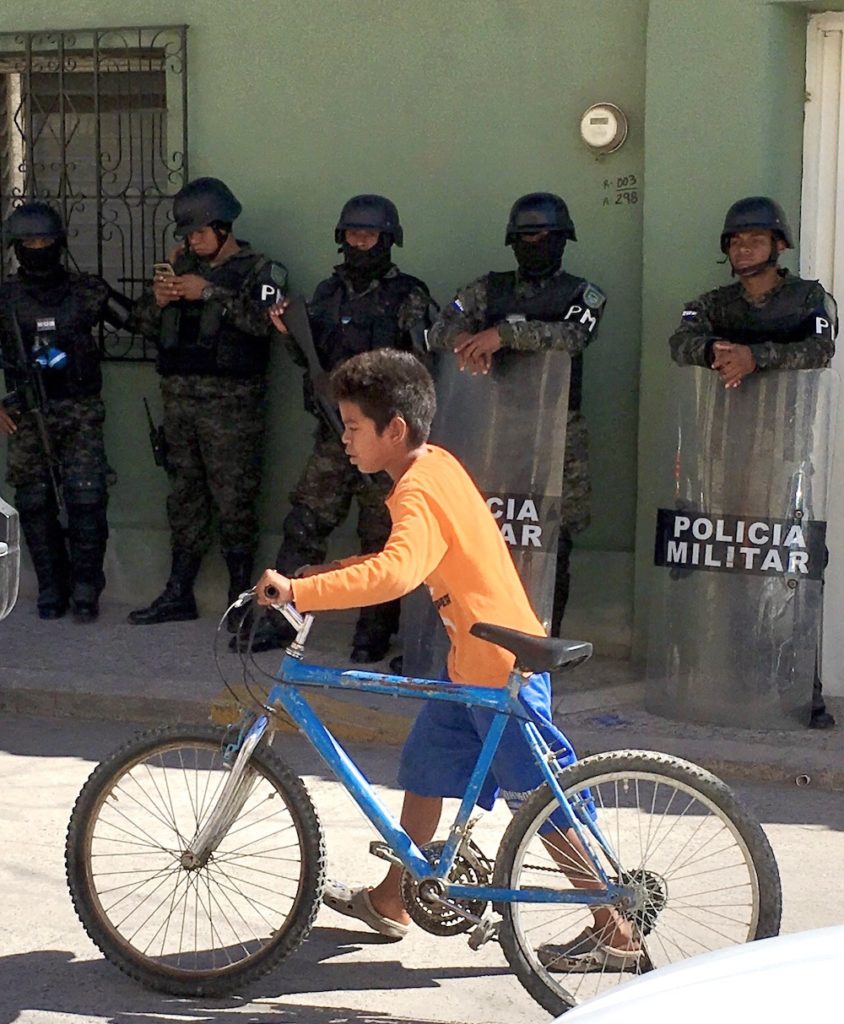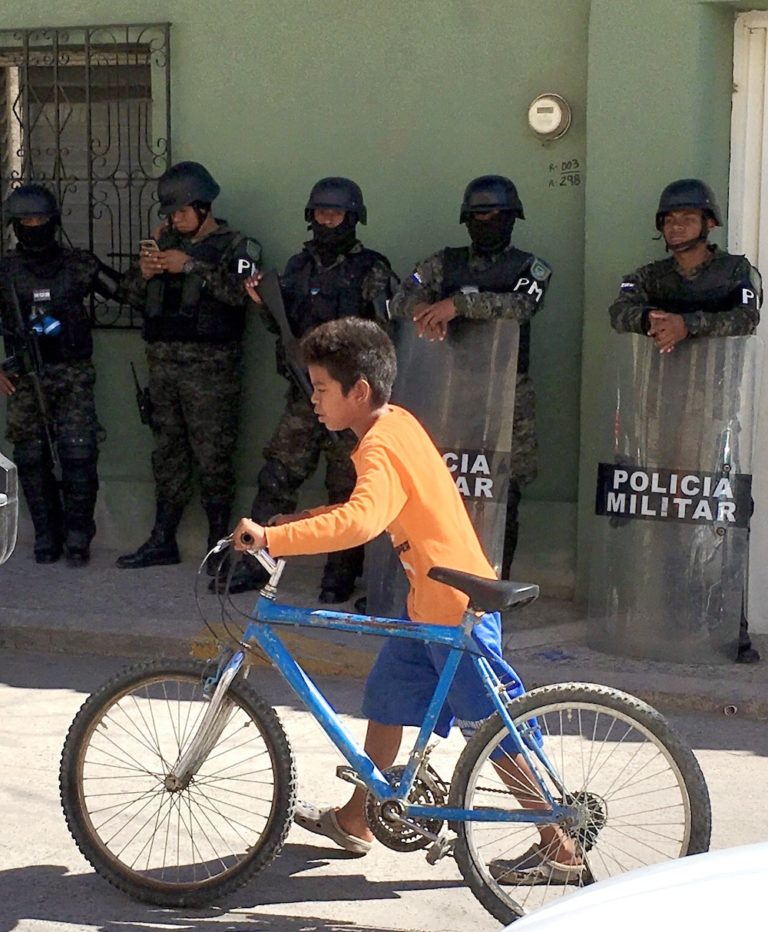
by Jim Phillips
Both Honduras and Nicaragua will hold presidential elections in November of this year. That means the United States, even under the Biden Administration, will be actively intervening in both countries to ensure that “favorable” candidates win in both countries. We seem to promote “democracy” by making sure our candidate wins, no matter the choice of the people of Honduras or Nicaragua.
Honduras
On Sunday, July 16, A French human rights observer was detained as she landed at the airport in Tegucigalpa, the Honduran capital. She was accompanied by her Honduran partner and their 3-year-old son who is a French citizen. The Honduran authorities let her husband and the son leave the airport and enter Honduras, but they confiscated her French passport and would not let her contact anyone, not even the French Embassy. Then, they put her on a plane to Panama. She spent a week separated from her partner and their son while Honduran and international human rights groups and organizations, including the Committee of Families of the Detained, Disappeared in Honduras (COFADEH) and the office of the UN High Commissioner for Human Rights challenged the Honduran government to allow the woman to enter Honduras, to no avail. Five years ago, she was coordinator for the Honduras Accompaniment Project (PROAH). She left Honduras shortly after the murder of Berta Cáceres, when many internationals were being targeted, denied entry, or deported from the country. This incident is seen as an act of harassment intended to send a message to other international human rights observers to stay away—especially disturbing because it signals that the Honduran authorities do not want international observers in the country during the run-up to the presidential election in November.
The United States will have a very big stake in assuring that the “right” candidate wins the Honduran election. Honduras is the primary support of the U.S. in Central America, invites much U.S. investment in mining, logging, and other extractive industries, and provides almost half of all the Central American immigrants arriving at the U.S. southern border. The current Honduran President, Juan Orlando Hernandez, and many members of his circle have been deeply implicated in drug trafficking in Honduras and the United States.
There are four major candidates to succeed him. For a while, the apparent front-runner was the mayor of Tegucigalpa, Nasry Asfura, a close ally of the current president and a member of the same National Party that has held power since the 2009 coup. Asfura recently visited Washington to “confer” with U.S. officials and to be seen as the candidate most favorable to the U.S. But in the last few weeks he has been slightly overtaken in the polls by Xiomara Castro, whose husband, Manuel Zelaya, was deposed in a U.S.supported coup in 2009 that was engineered in part by the current Honduran president. Castro represents Libre, the party that grew out of the massive opposition to the coup. She is considered the most progressive candidate.
A third candidate, Salvador Nasralla was the candidate of the anti-corruption opposition in 2017 and was widely believed to have been robbed of victory by irregularities in the vote count that gave the election to Hernandez, the current President. The fourth major candidate, Yani Rosenthal, is the son of a former vice-president and a member of one of the most prominent families in Honduras. He is the candidate of the Liberal Party and comes out of a political tradition that might best be characterized as “enlightened conservatism,” but his candidacy is burdened by his former conviction for corruption. As in the past two Honduran elections, we can expect more irregularities and accusations of fraud, or even the possibility that President Hernandez will not step down willingly. While “stolen election” is a myth in the U.S., it is unfortunately a reality in Honduras. Apparently, as long as the election is stolen by the candidate favorable to the U.S., it is not a steal but an exercise in democracy.
Meanwhile troubling incidents go unresolved. Four young Garifuna Indigenous men that were abducted a year ago have not been found, and no one has been charged in their disappearance. The Garifuna communities in northern Honduras have been struggling with foreign and Honduran corporations to keep their land and resources from being extracted. Several other widely publicized cases of environmental and human rights defenders from rural communities being arrested and imprisoned for their efforts continue without resolution. These and many other cases remain unresolved.
Public opposition is also growing to the imposition of “model cities” in several areas of the country—essentially free zones with their own laws where foreign extractive and commercial industries can develop. By one estimate, these “model cities” could displace as many as three million Hondurans—one-third of the country’s entire population. That seems exaggerated, but model cities sites have already displaced communities, and the concern is growing.
Nicaragua
The United States has a long history of intervention in Nicaragua, going back to the 1850s. There is also a history of disinformation accompanying these interventions to make them seem acceptable, even necessary. In the 1980s, President Reagan tried to make his support for the Contra war seem necessary to promote democracy. He lied about Nicaraguan life under the Sandinistas, saying, for example, that they were promoting godless communism and repressing religious freedom in Nicaragua. Meanwhile, as I saw at the time, Nicaraguans were able to attend church services freely, and they were aware that there were three Catholic priests and a Protestant pastor as Ministers in the country’s Cabinet. Reagan’s Administration lied a lot about Nicaragua.
We are currently in the middle of another quite sophisticated disinformation campaign about Nicaragua, promoted by both the U.S. government and many news media. This tries to paint Nicaragua as a country where the people are united in peaceful opposition to a cruel Sandinista dictatorship. In reality, there is a wide spectrum of opinion among Nicaraguans about their government. There is no peaceful opposition uniting the entire population, or even a majority of Nicaraguans. As the November election approaches, almost all the polls indicate that Daniel Ortega, the incumbent Sandinista president,could get about 65 percent of the vote. This level of support for the Sandinista government is attributed to the many improvements in Nicaraguan life achieved under the Ortega government, despite severe economic sanctions imposed by the U.S. The latest sanctions against Nicaragua are contained in the so-called Renacer Act being approved by the U.S. Congress. (To his credit, Sen. Merkley has declined to co-sponsor this Act.)
The United States has actively supported anti-Sandinista candidates for decades with millions of dollars for the opposition and disinformation against the Sandinistas. Let’s be clear: the Sandinistas and Ortega are no angels. But neither are they engaged in “widespread crimes against humanity” as some of the disinformation claims. When you read news items about Nicaragua, please sprinkle them with several grains of salt.
There is a sense now among many Nicaraguan and international observers, peace groups, and anti-interventionists that the United States is preparing the ground for a more direct intervention in Nicaragua. Rumors and fears are spreading in the country that there will be open conflict, even civil war in the next months as the U.S. intervenes on the side of the anti-Sandinista opposition before the November election. The fears and rumors seem to be triggering a rise in emigration from Nicaragua that until now has been only a small trickle of the flood of immigrants coming to the U.S. from Central America. Nicaraguans have been through this before, and the national trauma is still present. The defeat of the Sandinistas in the 1990 elections at the end of the Contra war was widely attributed to the fear expressed by many Nicaraguans that the U.S. would not leave Nicaragua in peace as long as the people voted the Sandinistas into power, and so people voted out the Sandinistas. That is less likely to happen again, but the U.S. seems to continue to try to impose “democracy” by coercion.This is not mere speculation. An internal U.S. policy document. “Responsive Assistance in Nicaragua” (RAIN) was leaked publicly late last year. It lays out three scenarios for removing the Sandinistas from power, two of which seem to involve creating some form of internal conflict or external intervention, or both. Stay tuned.
Actions You Can Take
Honduras:
Senator Merkley is the major sponsor of the Honduras Human Rights and Anti-Corruption Act that is seeking more co-sponsors in the U.S. Senate. Write to thank Senator Merkley for sponsoring this bill. If you are an Oregon resident, urge Senator Wyden to co-sponsor this bill. If you live elsewhere, urge your Senators to co-sponsor.
This bill calls for a halt to U.S. security aid to the Honduran police and military who are the major enforcers of the government’s repression of human rights, and are also much implicated themselves in crime and drug trafficking.
The Berta Cáceres Human Rights in Honduras Act that is seeking co-sponsors in the U.S. House of Representatives. This Act, originally sponsored by Rep. Hank Johnson (Dem-Georgia) now has a list of co-sponsors and is seeking more. This is the third year this bill has been introduced into the U.S. House.
The bill is designed to protect human rights and environmental defenders in Honduras.
Both of these Honduras bills are intended to make life less difficult for Hondurans by weakening the ability of the military and police to repress dissent,by highlighting the defense of human rights and the environment, and by trying to address corruption.
Nicaragua:
Ask your Senator and Representative to OPPOSE or refuse to co-sponsor the Renacer Act, “Reinforcing Nicaragua’s Adherence to Conditions for Electoral Reform Act of 2021” (Senate, S 1064). This bill adds more economic sanctions against Nicaragua, on top of several earlier bills that have placed severe economic sanctions on Nicaragua. This bill purposes to make life more difficult for Nicaraguans so that they will turn against the Sandinista government.


